The Independent Producer’s Notebook
Identifying Workable Spaces and Taking Stock of your Theatre Ecology
When we think of “producing,” we often think “institution.” There is a wealth of producers working outside and alongside organizations big and small, and their work is a vital part of our national theatre ecology. In this two-part series, two different Washington, DC-based producers reflect on their experiences, seeking to make their work visible, and bring reflection, analysis, and rigor to that independent, self-driven process. Read the other installment here.
Have a vision. Find a team. Know your options.
These are the first three challenges I’ve encountered as I embark on a six-month journey toward independent production in a regional market. I’ve never done it before. I’ve worked in the DC theatre community in a number of capacities—director, playwright, performer, and dramaturg—but I’ve never taken on producing before. This year, the folks at CulturalDC’s Mead Theatre Lab Program had enough confidence in me to select my project as part of their 2015-2016 season. I know from friends and colleagues that there are many challenges that come with producing independent non-traditional theatre in a regional market, but there isn’t a handbook that can tell me what to expect. I hope to use this space to share my own reflections as I jump on the self-production train, and spearhead a “best practices” conversation. So many of us reinvent the wheel as producers in seeming isolation, but I say let's learn from one another instead.
Ronee Penoi, a good friend and colleague of mine through The Welders, and I will share our perspectives and interview some folks about theirs as well. We hope to use the HowlRound community as a place for dialogue about the unique challenges faced by non-traditional producers. We’ll be thinking mostly about the DC theatre community, since that’s where we are, but we also want to hear from producers working in other cities!
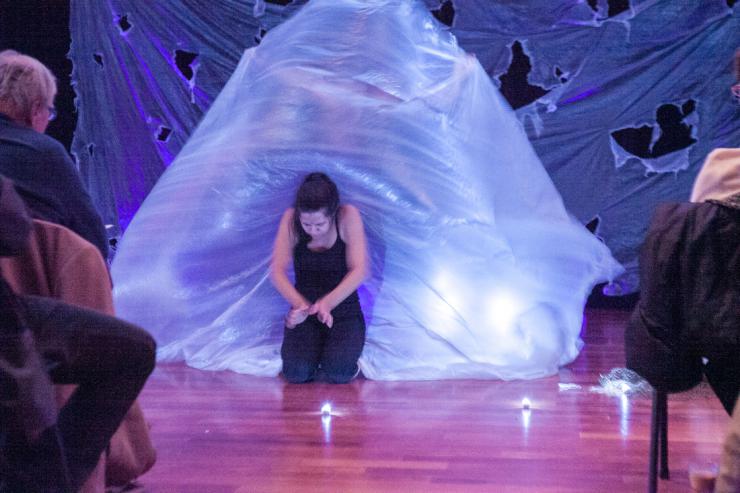
Have a vision.
To be a good producer, you first need to know what kind of work you want to do and, critically, why you want to do it. As I begin this journey, I know I’m operating under certain assumptions about theatremaking. In my eyes, if you don't have well formulated ideas about the kind of work you’re interested in, or if you can’t articulate why you’re passionate about it, you’ve probably already shot yourself in the foot. If you can’t articulate a perspective both on process and on product, you won't be able to convince others to join your team. I’ve already found that my ability to answer questions about my artistic vision clearly has helped me earn the confidence, trust, and respect of my colleagues. I make no claim that my vision is radically different from everyone else’s, but I have worked hard to make it cohesive and persuasive.
The piece I’m producing through the Mead Theatre Lab Program in April 2016 is called One Word More. It’s a devised, physical adaptation of Shakespeare’s The Tempest that reimagines the relationship between Prospero and Sycorax by examining the historical silencing of women’s voices and the dynamics of isolation, communication, and power. The project has several components that are rooted in who I am as a citizen-artist:
- Non-traditional, devised process with an emphasis on physical storytelling.
- Social consciousness, particularly in regards to race and gender based oppression.
- A community-integrated partnership with a local non-profit called the N Street Village, which is a community of empowerment and recovery for homeless and low-income women in Washington DC.
If you can’t articulate a perspective both on process and on product, you won't be able to convince others to join your team.
Find a team.
Convincing people to join a team is the brunt of the producer's work at the beginning, or so it’s been for me. I attribute my team-building skills to my ability to tell a coherent story about why I do the work I do. I know and trust that having this clear artistic vision for the work and myself will also eventually help with grant proposals, identifying a target audience, and creating a marketing strategy. So while having a vision will help you find a team, truly building a team is all about cultivating relationships. And that takes time. There’s no sidestepping here. Relationships come from being willing to take risks. The best advice about working in theatre anyone has given me thus far has been “ask for what you want.” Kathleen Akerley said that to me years ago while we sat at a bar one night. I promptly emailed her the next day and asked to assistant direct the project she was working on. She said yes. And it was working on that one production that led almost directly to many of the closest relationships I’ve built in the DC theatre community. If I hadn’t asked, I wouldn’t be where I am right now.
As a producer, spending real time with people you care about and whose work you admire is important, and not only for your sake as a human. It’s from these relationships that you cultivate that you build a team. It’s been three years since Kathleen and I met. She’ll be directing my piece at the Mead Theatre Lab this April.
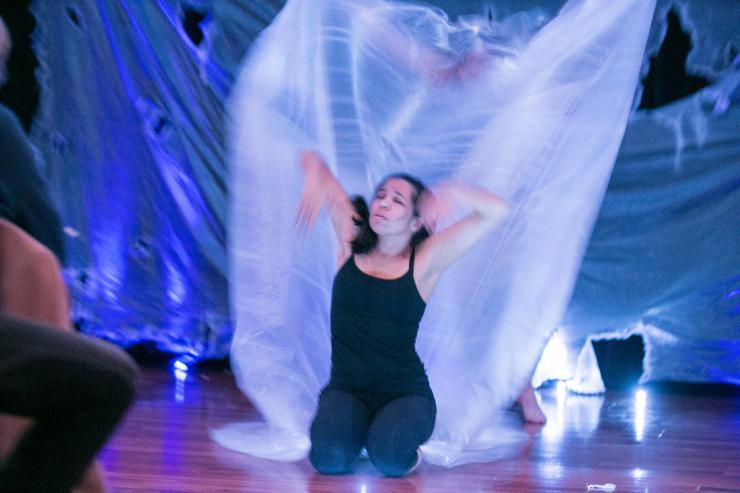
Know your options.
Great. I’ve got a vision and I’ve got a team. Now, where am I going to produce this project? Here’s the nitty gritty on what I’ve learned about the DC theatre ecology to date. This year, I’m working under the auspices of a longstanding program run by CulturalDC, which is part cultural development organization, part cultural producer. However, the Mead Theatre Lab Program is an unusual platform for the DC market. If I didn't have the space provided for me by CulturalDC, I would have difficulty finding potential performance and rehearsal spaces. There aren’t an abundance of venues for independent artists/producers interested in experimental forms or content. This is particularly true for those un-affiliated with theatre companies or universities with dedicated rehearsal or performance spaces.
It’s taken me the last three years to get a good handle on what viable sites for production are and how they work in DC:
- There are festivals, like Fringe, Intersections, Source, or the Black Theatre Festival.
- Pros: potentially wider audience; marketing gets included in festival marketing; and networking with community members.
- Cons: usually little control over ticket prices, which can make accessibility difficult in some cases; sometimes these have hefty application or production fees; short production and run times; and over-saturated market during festivals.
- There are special event-based programs run by individual theatre companies that look for submissions throughout the year.
- Pros: helpful for developmental activities and audience feedback; often no fees associated with producing; and companies usually take care of marketing.
- Cons: one time only event; usually very little technical capabilities; you have to know who’s producing what, and when they’re going to put out calls.
For example: I produced a developmental version of One Word More last year through the “Happy Hour at the Harman” series at the Shakespeare Theatre Company, and I worked on experimental content for the show this year at Synetic Theatre’s Dark Night Showcase.
- There’s always the possibility of site-specific or site-adaptive work.
- Pros: potentially wider audience; and potential for unrestricted accessibility.
- Cons: requires detailed knowledge of city event permits if you’re looking to perform, or rehearse in public spaces. It’s not impossible, but sometimes daunting.
- Let’s not forget the non-Equity theatre companies.
- Pros: these teams already have experience producing in the market; they’ll be able to produce a full run; and they already have funding streams and a marketing base.
- Cons: takes work to build those connections with the folks who run the organizations, but if you’re a playwright or other type of generative artist interested in a full run of a show; and it may be the way to go if there’s a company whose mission is in line with your own.
In looking at these venue options, I think it's important for a producer to consider what they want, take stock of who in the theatre community may want those same things, and take the time to articulate a shared vision for working within the community. I'm curious as to how other artist/producers enter this process as well. How do you bring certain core values, beliefs, and vision upfront? What do other cities look like in terms of viable production venues? How do you navigate your local theatre ecology to find supportive venues for rehearsal and performance?


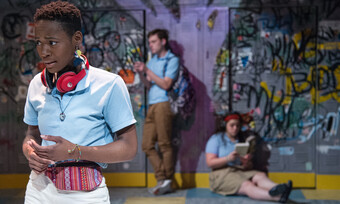


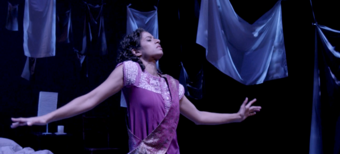

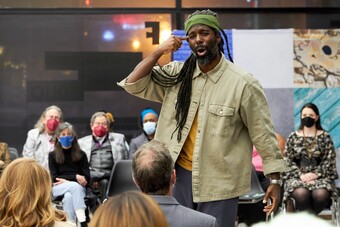




Comments
The article is just the start of the conversation—we want to know what you think about this subject, too! HowlRound is a space for knowledge-sharing, and we welcome spirited, thoughtful, and on-topic dialogue. Find our full comments policy here
This is terrific and incredibly insightful! I remember you found out about getting to do the 2014 version while we working at ATHE so I can't wait to follow the journey of "One Word More" and see where this takes you!
Hey! haha! How cool to reconnect here. Are you going to be at ATHE in Chicago?
Yes! We will have to catch up!